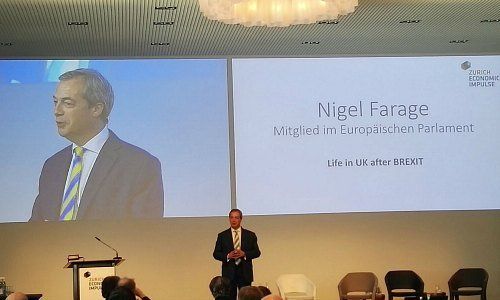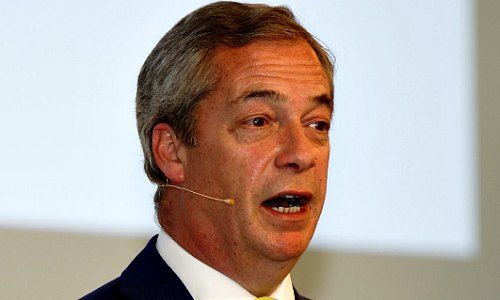Nigel Farage: «The City Leaving London? I Don't Think So»
Anti-EU campaigner Nigel Farage spent the day after «Brexit Day» addressing Swiss bankers in Zurich. finews.asia tried to get answers from him about Britain's financial industry would fare outside the bloc.
Nigel Farage was spotted celebrating «Brexit Day» in a Westminster pub last week with a «Breitbart» journalist. One day later, he popped up in Zurich, at a lush conference center overlooking the lake on the outskirts of town.
The former leader of Ukip, the British anti-EU party he co-founded after leaving the Conservative party in the 1990s, was in Switzerland at the invitation of a two-day business and political conference, Zurich Economic Impulse.
If Farage, the last speaker on the conference’s final day, was disappointed to speak about «Life in UK After Brexit» to an audience whose ranks had thinned, he didn’t show it.
Triumphant Brexit
An enormously charismatic and eloquent speaker, he began his remarks by triumphantly recounting the British ambassador’s delivery of Great Britain’s formal «goodbye» letter in Brussels the day before.
«And now, we have passed the point of no return. There is no doubt about one thing: Britain is leaving the European Union,» Farage told the audience of Swiss bankers and businesspeople.

Farage prides himself on his City pedigree, though the «Financial Times» (behind paywall) reported that his run in commodities, begun before the Big Bang in 1986, was modest: one of the metals broking firms he co-founded went broke.
Withering Sarcasm
His 20-minute remarks in Zurich, spoken without notes, were part-stump speech and part-victory lap, aimed at reassuring his audience that Britain remains open for business.
«The other great myth that Brexit would be a disaster for the City of London, everybody’s gonna leave London and live in that gorgeous place called Frankfurt? I don’t think so,» he said with withering sarcasm – a sentiment met with knowing laughter in Zurich.
He made scant reference to Britain’s prospects for trade, currency, capital flows or economic growth in coming years.
«Come and Have a Go»
Earlier, he had called for audiences questions by urging «I want some real punchy ones, guys, come and have a go.»
So finews.asia did: I interviewed Farage to get answers about what the City of London, which has been hugely influential in shaping the EU’s financial regulation in recent years, would look like without automatic access to the common market that it has enjoyed for the past 44 years.
We got off to a bad start: Farage, raspy and his shirt drained with sweat, interrupted me five seconds into my first question to correct me, then again at eight seconds, and once more at ten seconds before I ask him to «maybe let me ask the question.»
Here’s what happened next:
The City of London is petrified that they’re going to lose out. What sort of leverage will it have in Brussels?
I think what you hear of as the City is a gross misinterpretation. Deutsche Bank and Goldman Sachs – that isn’t the City. When you go into a different level in the City, when you go and talk to the insurance brokers, the foreign exchange dealers, the practitioners, I found some of the most Euroskeptic people I’ve ever met in the entire country. Because of course they view Britain as being the centerplace of a global market, therefore Europe – whilst important – is not absolutely, so the first thing is to say that there’s a slight misinterpretation there.
Now, I do understand that for Goldman Sachs the European Union is fantastic. [Farage embarks on a potentially defamatory description of Goldman Sachs' involvement in Greece and Italy and its ties to the European Union, which finews.asia has redacted]. They’re now able to write the rules for their own industry – I completely get that – much to the detriment of almost everybody else. They won’t like it.
But financial services in Britain is about a lot more than Goldman Sachs and interestingly, it’s about a lot more than the City of London. Financial services is big in Cardiff, Eastbourne, Leeds, it’s everywhere.
You’re talking about services for the financial industry.
Absolutely, the whole industry. And my argument is this: I think that we’ve got a better chance of getting appropriate regulation for that industry by actually debating it in general elections, on the floor of the House of Commons, and being in charge of our own industry rather than handing away control of it to somebody else and having a minority say.
My question was the leverage that the industry as a whole--(interrupts)
OK, at the moment we have 8 percent leverage in Brussels. 100 percent leverage after Brexit.
How? I’m talking about political leverage.
Well of course. We have an 8 percent say in Brussels in what goes on. Sure there are some big players who are influential, but we have an 8 percent say – oh and by the way, we don’t have a veto, so under qualified voting majority, we can lose again and again and again and again on financial market regulation. The financial industry will have 100 percent input into what U.K. law.
But the fact is, you haven’t lost in the last few years: the hedge fund industry, the asset management industry is enormously influential--
I’m very sorry, I couldn’t disagree more fundamentally.
There’s a reason that the asset management industry and hedge funds haven’t all left the City of London. The industry has had a huge say in European regulation.
Twenty-five percent of them left within nine months of AIFMD (the Alternative Investment Fund Managers Directive, Europe's most recent piece of hedge fund regulation).
Of all hedge funds?
Yep, hedge funds, managed funds. Off they went, of course they did.
It was remarkable that the EU’s response to the credit crisis was to put in place regulation of hedge funds, which didn’t issue or use credit other than day trading. AIFMD was a very badly-timed piece of legislation and it showed the dangers of not being in control of your own life and your own industry.
I believe in competition. The idea of creating everything the same, over a broad area is actually fundamentally anti-competitive if you believe in tax competition and regulatory competition, which I most certainly do. Actually, where there are differences between things, it creates more business, not less business.
Paint a picture of the financial services industry as a whole in five or ten years from now.
Well if Britain goes global it’ll be a damn sight bigger than it is now!
With this, the Brexiter abruptly fled the interview after less than five minutes for the safety of three men waiting patiently nearby to take selfies with him.

I spot him later on the venue's sunny terrace, smiling as he lights a cigarette and enjoys the view of lake and mountains.
For Farage, who has devoted the last 20 years to getting Britain out of what he referred to in his remarks as «that corrupt union», the campaign has ended. For the City of London, it is about to begin – without him.
Nigel Farage, who turns 53 on Monday, is best known for co-founding the anti-European Ukip, or the U.K. Independence Party. In 1982, he eschewed University for the City of London, where he began trading commodities. A member of the European parliament since 1999, Farage worked for Drexel Burnham Lambert and Refco during his financial career. His connection to the City has faded with the rise of Ukip, which he led from 2006 to 2009 and again from 2010 to last year. He was branded a coward when he stepped down last June following a successful campaign for Britain to leave the European Union. Britain triggered the formal two-year process to leave the bloc on March 29, 2017.




























